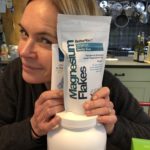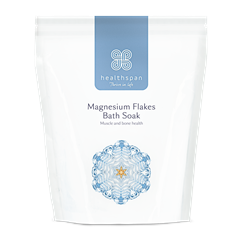The indignities of middle age pile ever higher. A quick glance in my bedside drawer is all it takes to confirm that I’m on the downward slide. Sleep doesn’t come easy, so I’ve earplugs, a lavender-filled Liberty Eye mask, melatonin (available on prescription for the over 55s), hand cream, lavender drops and – most importantly – magnesium in all forms.
To hav e within arm’s reach magnesium spray, lotion and even tablets may constitute a product overload but fellow sufferers of the debilitating condition known as ‘Restless Leg Syndrome’ will know that there are few lengths to which we sufferers won’t go in order to banish the symptoms of this little-understood condition.
e within arm’s reach magnesium spray, lotion and even tablets may constitute a product overload but fellow sufferers of the debilitating condition known as ‘Restless Leg Syndrome’ will know that there are few lengths to which we sufferers won’t go in order to banish the symptoms of this little-understood condition.
When I was younger it struck only when I was overtired or in cramped conditions, so aeroplane journeys and nights at the theatre were particular triggers. Now there’s no accounting for when the telltale signs – a slight fizzing in my calves that swiftly becomes a brain addling desperation to stretch my ‘restless’ leg – will turn a relaxing night’s sleep into a marathon of irritated wakefulness.
Endless wriggling and jiggling, leaping in and out of bed to try and stretch only to return and the cramp to strike again is how a bad night used to go. On the advice of a friend I splashed out on magnesium tablets and within a few days the worst of my symptoms had eased off. But still, there were nights when I was woken at 2 or 3 am, the telltale ache in my lower calves making sleep an impossibility.
That’s when I added spray to my shopping list and it’s become something of a miracle cure. A quick squirt on the affected area before I go to sleep and the worst of my symptoms are vanquished. On the rare nights when there’s time for a pre-bed relaxing bath, in go the flakes as well. If you know of any other means of imbuing it do let me know.
Carrie Ruxton PhD is an award-winning dietician, health writer and TV nutritionist. She says: Magnesium is an essential mineral found in such foods as nuts, legumes, whole grain cereals, broccoli, spinach, seeds, fish and dairy foods as well as chocolate, coffee, mineral water and ‘hard’ tap water.
It’s necessary for over 300 chemical reactions; nerve impulses, digestion, muscle function, blood pressure, the heartbeat, and blood sugar levels as well as supporting bone structure and lowering the risk of developing type 2 diabetes and heart disease. The European recommendation for magnesium is 375 mg per day. Whilst clinical deficiency is rare, it’s thought that more than one in ten adults don’t get enough. Deficiency is linked to migraine, leg cramps and muscle spasms.
THREE WAYS TO TAKE:
Try the BetterYou Magnesium range, which includes a Magnesium Body Butter £12.95, a Magnesium Oil Spray £12.95, and MagnesiumFlakes £3.99, all from betteryou.com.
Always excellent value and quality at Healthspan: Try their Magnesium Tablets (90) £8.45, healthspan.co.uk, and Magnesium Flakes Bath Soak, £9.95, healthspan.co.uk
Solgar Magnesium Citrate £1149 (60), provides 100 per cent of the magnesium you need, hollandandbarrett.com
*Magnesium supplements can interact with certain medicines. Always consult your doctor if you are taking antacids, antibiotics or blood pressure drugs or have any medical conditions.


